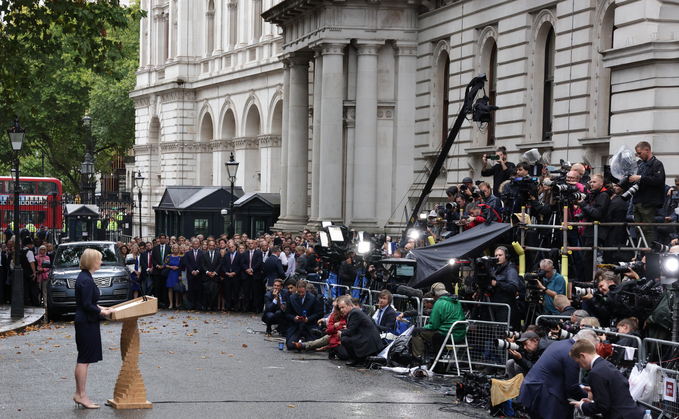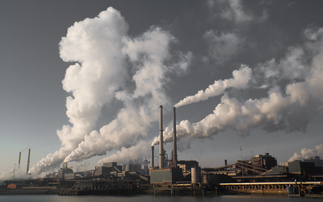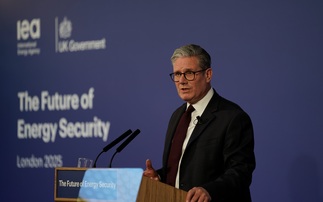
Liz Truss makes her first address as PM on 6 September | Credit: Number 10, Flickr
Liz Truss and the Conservative Party have brought chaos to UK politics, and the UK's competitiveness in a decarbonising world risks becoming one of the many casualties
Thank God, that's over. Except, of course, it isn't over. Not even close.
Liz Truss' shamefully disastrous premiership has been brought to a close, the final blow dealt by the cack-handed attempt to press gang MPs into marching through the lobby to allow fracking projects that virtually no one wants, that are vanishingly unlikely to deliver any gas, and that they promised to ban. A life's over-weaning ambition destroyed by the bizarre assumption that Lancashire is Texas and climate change is not that big a deal.
But while the defenestration of a Prime Minister so manifestly unfit for the job is as welcome now as it was earlier this summer when Boris Johnson's lies and laziness finally caught up with him, there is still no sign of a line being drawn, of some order and seriousness being restored.
The Conservative Party has become ungovernable. Destroyed by the rising waters of economic mismanagement, the rolling storms unleashed by Brexit, and the decade-long drought of new ideas, serious leadership, and competent Ministers.
There has been not the slightest hint of self reflection from the think tanks, advisors, media outriders, and Ministers who delivered this crisis. In her utterly inadequate resignation speech, Truss referred to the "situation" that had necessitated her resignation. There was no flicker of contrition or even understanding as to what that "situation" was and who had caused it. No attempt to explain the many unforced errors made and the soaring interest rates, financial instability, and general insecurity that has directly resulted from her choices.
The tragedy of Trussonomics was that it diagnosed precisely the right problem - the UK's flatlining productivity and growth and the degraded public sphere and worsening competitiveness that has resulted - and then set out a prescription so arrogant and so detached from reality that it quickly made everything worse.
And so the dangerous myths and stab in the back narratives begin. Libertarianism has failed because it wasn't tried properly. The deep state and unaccountable markets engineered the downfall of someone who dared to challenge orthodoxy. The only solution now is austerity 2.0 and all that entails.
Immense damage has been done in the cause of an economic and political experiment that had no mandate beyond Truss' genuinely pathetic claim that she was trying to enact the mandate handed to her by a modest majority of Tory party members - an argument that once again relegated the rest of the populace to a second tier consideration.
It is genuinely hard to keep track of all the ways the UK has been weakened over the past six months. But it is worth unpacking where the country stands with regards its net zero transition given its immense importance to our long term economic and planetary health.
The UK is a genuine world leader on climate action, having adopted one of the world's first Climate Change Acts, built a globally significant offshore wind industry, and delivered significant cuts in emissions over the past 20 years while pioneering a host of clean technologies.
And yet, this summer the Climate Change Committee warned the country was badly off track to meet its emissions goals for the 2030s onwards. The High Court concurred, ruling that the government's Net Zero Strategy was unlawful. On energy efficiency, electric vehicles, sustainable agricultural, hydrogen, carbon capture, nuclear, behaviour change, and countless other areas where the UK had the potential to secure a competitive advantage, boost the economy, bolster its security, and cut emissions, businesses remain stuck in a holding pattern, their investments paused or undermined by a lack of policy clarity and political leadership.
For all his encouraging rhetoric on climate action, this was the challenge Johnson bequeathed to Truss. And he handed over this faltering transition at a time when the US, China, the EU, and many other leading markets were doubling down on their climate policies as they rightly recognised that clean technologies hold the key to protecting them against Putin's aggression and unlocking a new era of economic development that the latest evidence suggests could soon start to drive down global emissions.
And what did Truss do? She talked of banning solar farms, reviving fracking, and getting every drop of oil out of the North Sea. She ignored energy efficiency and launched an attack on nature. She went to war with both the markets and the RSPB. She may have promised to lift the de facto ban on onshore wind farms and committed to continued investment in low carbon infrastructure. But she didn't last long enough in office to deliver either. She put Jacob Rees-Mogg in charge of climate action and energy security, placing no requirement on him to recant his previous climate scepticism and thus torching what little credibility she had left with the business community. She drove up interest rates and undermined financial stability, making it harder to deliver the capital-intensive projects that lie at the heart of the net zero transition. All in all, it was an investment-destroying, confidence-shredding, pollution-enabling mess.
And now her successor has to try and clean up this full spectrum policy chaos, while maintaining the support of a coalition of MPs who range from full blown climate sceptics to unabashed climate hawks, from populists to fiscal conservatives, from centrists to conspiracy theorists who would slot right into the modern Republican Party. It is an impossible task.
Are there any silver linings? Well, the parliamentary system and the UK's unwritten constitution has worked in its bizarre and imperfect away, ejecting yet another premier who was demonstrably not up to the job.
Meanwhile, the rational, popular, and economically essential path forward is more obvious than it has ever been. Invest in energy efficiency, call on businesses and the public to support the national interest by saving energy at every turn, remove barriers to renewables deployment, accelerate the EV roll out, reform power markets to curb our reliance on gas, provide policy clarity for CCS, hydrogen, and nuclear, maintain R&D spending, introduce a national green skills programme, ask people to consider eating a bit less meat, reform farming subsidies, restore relations with our closest neighbours in support of continent-wide decarbonisation, borrow to invest in productivity-boosting green infrastructure and tax those with the broadest shoulders to help pay for it all, and consign those reponsible for the last six months of genuinely disastrous government and hugely damaging policy choices to the furthest margins of public life.
It is an agenda that would stop the UK squandering the leadership position it had started carving out in the industries of the future, would command genuine public support, and would finally start to trigger some growth and dynamism after a decade of economic failure. Could Sunak, Mordaunt or even Johnson deliver such an agenda? Perhaps, but then could they bring their fractious party with them? It looks increasingly likely that if the UK is to get the net zero focused economic agenda it so desperately needs then we will need an election to deliver it, and there are no guarantees we will get one any time soon. The chaos is not over yet.
A version of this article first appeared as part of BusinessGreen's Overnight Briefing email, which is available to all BusinessGreen Members.










